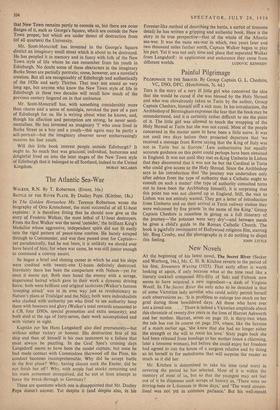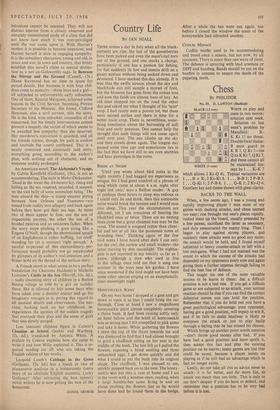New Novels
AT the beginning of his latest novel, The Secret River (Seeker and Warburg, I6s.), Mr. C. H. B. Kitchen reverts to the period of his first, Streamers Waving (1925). That early effort is worth looking at again, if only because what at the time read like a literary cocktail composed fifty-fifty of Saki and Firbank now seems to have acquired a new ingredient—a dash of Virginia Woolf. In The Secret River the only echo to be detected is that of some Victorian lady novelist who could safely permit herself such observations as : 'It is profitless to enlarge too much on her grief during those bewildered days. All those who have ever lost a loved one. . .' There is indeed a Victorian amplitude about this chronicle of twenty-five years in the lives of Harriet Ashworth and her mother. Harriet, seven on page 10, is thirty-two when the tale has run its course on page 359, where, like the heroine of a much earlier age, 'she knew that she had no longer either the strength or the will to resist his love.' Sixty pages back she had been released from bondage to her mother (once a charming, later a tiresome woman), but before she could enjoy her freedom had agreed to run the house of a surgeon relative and by doing so let herself in for melodrama that will surprise the reader as much as it did her.
Mr. Kitchen is determined to take his time (and ours) in covering the period he has selected. Most of it is within the memory of most of us, but so that the youngest may not feel out of it he dispenses such scraps of history as, 'There were no driving-tests or L-licences in those days,' and 'The word stream- lined was not yet in common parlance.' But his well-meant
intrusions cannot be resented. They will not distract interest from a closely observed and minutely remembered study of a class that did not know how much it was over-privileged until the war came upon it. With Harriet's mother it is possible to become impatient, and Harriet herself is slow in engaging sympathy. It is the subsidiary characters, young and old, in peace and war, in town and country, that firmly establish this novel's claim to special distinc- tion as a not un-Galsworthy saga. In Between the Stirrup and the Ground (Cassell,. 15s.) Diana Raymond has no time to spare for period details. Her business is with four chil- dren come to maturity—three boys and a girl— all subjected to unfavourable early influences. One of them, Ronald Marquess, achieved some success in the Civil Service, becoming Private Secretary to his Minister. His friend, Clifford • Henrison, also a civil servant, tells the story. He is the kind, wise onlooker, counsellor of all concerned, but his timely interventions cannot prevent a tragedy, the victim of which seems to he awarded less sympathy than she deserved. Her murderer's conviction is quashed, and all his friends rejoice, though his guilt is evident and (outside the court) confessed. This 'is a neatly contrived and cautiously told story, everything going according to the author's plan, with nothing out of ,character, and no suspense unduly prolonged.
An American novel, The Alchemist's Voyage, by Calvin Kentfield (Gollancz, 15s.), is not so accoMmodating. The style is Moby-Dickensian: 'Dead in the water the Alchemist lay, rising and falling as the sea respired, stranded, it seemed, on the vast belly of some somnolent being.' The men aboard the ship—a tramp steamer plying between New Orleans and Freetown—are tossed from reality into allegory and back again before they have got their sea legs. At times two of them appear to fuse, one the son of respectable parents, the other the son of a brothel mistress and an unknown father. When the story stops pitching it goes along like a Eugene O'Neill, though the phoneticised speech of an Englishman is rather baffling, 'rot enuff' standing for (at a venture) 'right enough.' A careful re-perusal of this extraordinary per- formance would probably not go unrewarded by glimpses of its author's real intention and a firmer hold on the thread of the surface story.
A French novel in what seems to be a perfect translation (by Charlotte Haldane) is Michelle Lorraine's Castle in the Sea (Harvill, 10s. 6d.), a sadly charming story of children in a Breton fishing village as told by a girl on holiday there. She is allowed to join some boys who have taken over a derelict cruiser and go for imaginary voyages in it, paying due regard to all nautical details and observances,. The nar- rator, looking back on her childhood, re- experiences the agonies of the sudden tragedy that overtook their play and the sense of guilt that was slowly purged.
Less innocent children figure in Colette's Claudine at School (Seeker and Warburg, 12s. 6d.), translated by Antonia White. A preface by Colette explains how she came to write it and how Willy exploited it. This is re- quired reading for all who are taking the English edition of her works.
Leopold Louth's Cabbage in the Grass (Gollancz, 12s. 6d.) has a touch or two of plaisanterie gauloise in a boisterously funny story of an idealistic English eccentric. Lucky Gollancz! After attracting the best mystery novel writers he is now getting the best of the humorists.
DANIEL GEORGE



















































 Previous page
Previous page